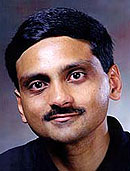S. Ravi Rajan, associate professor of environmental studies and provost of College Eight, has received a major grant from the National Science Foundation to investigate the intersection of science, democracy, and environmental risk in India.
Rajan's project will expand the field of science and technology studies to include the largest democracy in the world.
"We want to understand how science advocacy in the process of public policy regarding environmental risks is constrained by politics," said Rajan. "Science policy is much more political than scientists are typically willing to concede." Rajan received a grant of nearly $190,000 for the work.
During the three-year project, Rajan will lead a team of graduate students in environmental studies who will investigate how science, politics, and policy interact in three sectors in India: hazard and impact assessment, chronic risk mitigation, and emergent risks. Case studies in the three areas will focus on the decision to build a large dam in a seismically active area, the mandate to fuel vehicles in Delhi only with compressed natural gas, and the introduction of genetically modified cotton in agriculture. Rajan and his students will also investigate other case studies in each sector in India and elsewhere in the Third World.
"Most policy making is predicated upon what scientists say needs to get done, but environmental policymaking is peculiar, because different scientific groups make different claims about what the risks are and how they need to be managed," said Rajan. "We don't understand how those dynamics work in places like Brazil, India, and Mexico--democracies where people have the freedom to interact. The exact ways a specific policy initiative wins remain mysterious."
During the past decade, scholarship in this area has focused on the advanced industrial nations of North America and Western Europe, noted Rajan.
"We blindly apply risk-management strategies that have been developed in the United States and export them to developing countries, but we need to understand the economic, social, and political contexts in which risk decisions get made," he said. "This project will help fill a gap in the literature about the role of scientific expertise in environmental controversies that are playing out in the developing world."



